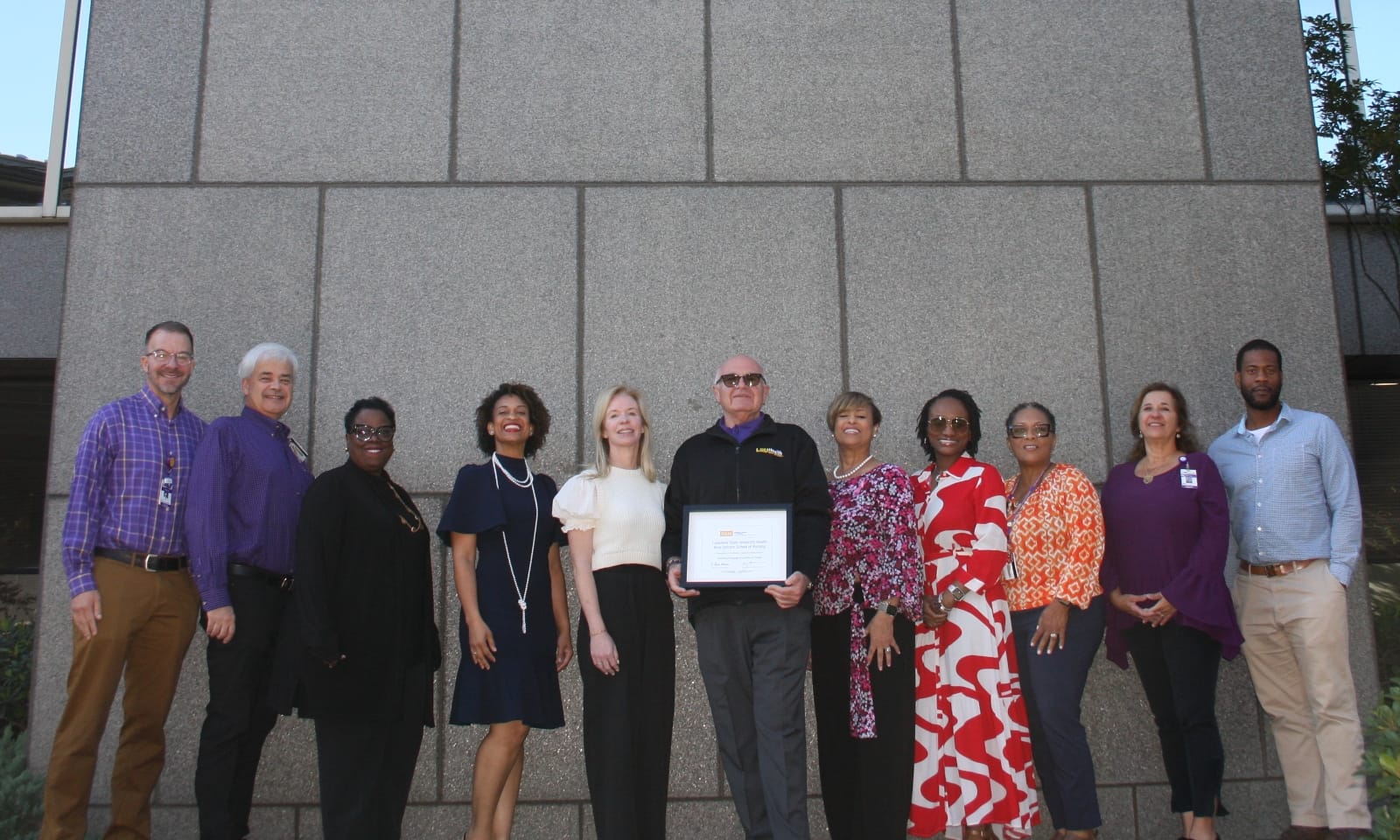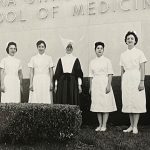At Commencement in May 2023 and for the first time, graduates who were members of the LSU Health Sciences Center New Orleans School of Nursing Diversity, Equity and Inclusion Student Association donned special cords and its officers wore leadership stoles.
Formally recognized in 2021, the DEI-SA has been incredibly active in its mission to provide a welcoming and supportive campus climate by embracing various cultures, races, genders, perspectives, religions, languages and walks of life.
“This student organization is giving students from diverse backgrounds a sense of belonging,” says Kendra M. Barrier, PhD, MSN, RN, CNE, Associate Dean for Diversity, Equity and Inclusion and Assistant Professor of Clinical Nursing. “It has evolved from students just coming into my office when I was Assistant Dean for Student Services, saying they wished they had a place where they could talk about their experiences at the School of Nursing, to a task force, to an official organization encouraging our diverse student population and celebrating diversity in the nursing profession and beyond.”
In an effort to address racial and structural inequities within nursing education and health care, the organization hosts monthly “Study with DEI-SA” sessions, open to all students. Some sessions have featured faculty presentations on study tips, test-taking strategies and the importance of group studying for success, among other topics.
In the Spring 2023 semester, the DEI-SA also attended the HBCU Legacy Bowl and hosted a “Skate with DEI-SA” event as a fun way to introduce more students to the organization.
Creating a “Museum” of Monumental Women
As part of its mission to celebrate the achievement of diverse figures throughout history, the DEI-SA’s inaugural Live Wax Museum recognized historically significant Black women during Black History Month 2023. The organization invited students, faculty and staff to dress as influential Black figures and learn about other influential individuals.

Benita Chatmon, PhD, MSN, RN, CNE, Assistant Dean for Clinical Nursing Education and Assistant Professor of Clinical Nursing, portrayed Brig. Gen. Hazel Johnson-Brown, first Black chief of the U.S. Army Nurse Corps and first Black female brigadier general.
Johnson-Brown was an operating room nurse who graduated from the Harlem Hospital School of Nursing and joined the U.S. Army in 1955. Following her retirement, she enjoyed a distinguished second career in academia, serving as professor of nursing at Georgetown University in Washington, D.C., and at George Mason University in Virginia. At George Mason, she was instrumental in founding the Center for Health Policy, designed to educate and involve nurses in health policy and policy design.
Demetrice Smith, DNP, MN, FNP-C, CNM, Assistant Program Director of Nurse Midwifery, Instructor of Clinical Nursing and DEI-Faculty Advisor, portrayed Ethel Hedgeman Lyle, who founded the first Black sorority for college women, Alpha Kappa Alpha Sorority, Inc. (AKA), at Howard University in 1908. An educator and activist, Lyle also founded the West Philadelphia chapter League of Women Voters. The Ethel Hedgeman Lyle Academy, a charter school in St. Louis, Missouri, was founded in her honor in 2000.

Jacqueline Vinson, a SR I nursing student and senior nurse tech at LCMC Health, was Susie King Taylor, who was born into slavery and became the first Black nurse in the Civil War. She was one of the organizers of the 67 Corps of the Women’s Relief Corps in 1886 and was the first Black woman to publish a memoir: Reminiscences of My Life in Camp with the 33rd United States Colored Troops, Late 1st S.C. Volunteers.
Leanne Fowler, DNP, MBA, APRN, AGACNP-BC, CNE, FAANP, Program Director of the Nurse Practitioner Program, Program Coordinator of the Adult Gerontology Acute Care Nurse Practitioner Concentration and Associate Professor of Clinical Nursing, portrayed Coretta Scott King, author, activist, civil rights leader and wife of Dr. Martin Luther King Jr.
SR II nursing student Danielle Bellone presented information about Dr. Joycelyn Elders, the first Black and second female Surgeon General of the United States. While Dr. Elders was Director for the Arkansas Department of Health, the state saw a reduction in teen pregnancy rates, increases in the availability of birth control and sex education, a tenfold increase in early childhood screenings, a 24% increase in immunization rates for 2-year-olds, the expansion of HIV testing and counseling services, more breast cancer screenings and expanding hospice care for the elderly.
JR I student Meagan Morgel portrayed Anarcha Westcott, a 17-year-old enslaved woman who underwent many experimental and painful procedures at the hands of a plantation doctor named J. Marion Sims, under no anesthesia and without consent. The surgeries performed on Wescott revolutionized the field of gynecology, and many refer to her as the true mother of gynecology.

JR II student Trina Williams, Vice President of the DEI-SA, portrayed Ava Duvernay, an American director, producer and writer who has risen to fame for exploring the Black experience. Duvernay gained critical attention when she made the documentary “This Is the Life,” about the creation of the hip-hop movement. She is a Primetime Emmy Award winner and an Academy Award and Golden Globe nominee.
JR II student Dacia Coleman, President of the DEI-SA, was American talk show host, television producer, actress, author, activist and media proprietor Oprah Winfrey. Winfrey has been dubbed the “Queen of All Media” and has had the opportunity to interview some of the biggest names in America.
JR II student Olivia Richon portrayed Virginia Johnson, a founding member and current artistic director of the Dance Theater of Harlem. One of Johnson’s most recognized roles was as Giselle in Arthur Mitchell’s “Creole Giselle,” the first full-length classical ballet the company would perform.
Chontel Carter, MSN, FNP, Instructor of Clinical Nursing and DEI-SA Faculty Advisor, portrayed Misty Copeland, the first Black female principal dancer with the prestigious American Ballet Theatre and co-author of the New York Times Bestselling memoir Life in Motion. Copeland has been featured in numerous publications and television programs.

Kendra Barrier, PhD, MSN, RN, CNE, Associate Dean for Diversity, Equity, and Inclusion, Assistant Professor of Clinical Nursing and Administrative Liaison for the DEI-SA, personified Dr. Maya Angelou, an American memoirist, poet and civil rights activist who published seven autobiographies, three books of essays and several books of poetry, and is credited with a list of plays, movies and television shows spanning more than 50 years. Dr. Barrier recited Dr. Angelou’s “Phenomenal Woman.”
Celestine Carter, APRN, DNS, Assistant Professor of Clinical Nursing and Faculty Advisor for the Students Veterans of America Association (SVA) portrayed both Dr. Myrtis Snowden and Dr. Mervell Lois Winzer Bracewell. Dr. Snowden, Emeritus Professor at LSU Health New Orleans School of Nursing, was posthumously inducted into the Louisiana Nurses Foundation Hall of Fame. Dr. Bracewell served in the U. S. Air Force Nurse Corps from 1954 to 1958, attaining the rank of first lieutenant. She accompanied the Tuskegee Airmen on domestic flights, including to Shreveport.
Wendy Gerhardt, MSN, CNM, Instructor of Clinical Nursing, portrayed Mildred Bibbens, a midwife from the St. Francis area known for successfully delivering more than 3,000 babies of all sizes. She was frequently unpaid for these critical services, and in the 1920s, ’30s, and ’40s, she would sometimes perform deliveries in exchange for food. Later, she largely helped Caucasian mothers looking to get away from standardized medical births. She delivered her last baby when she was 78 years old.







